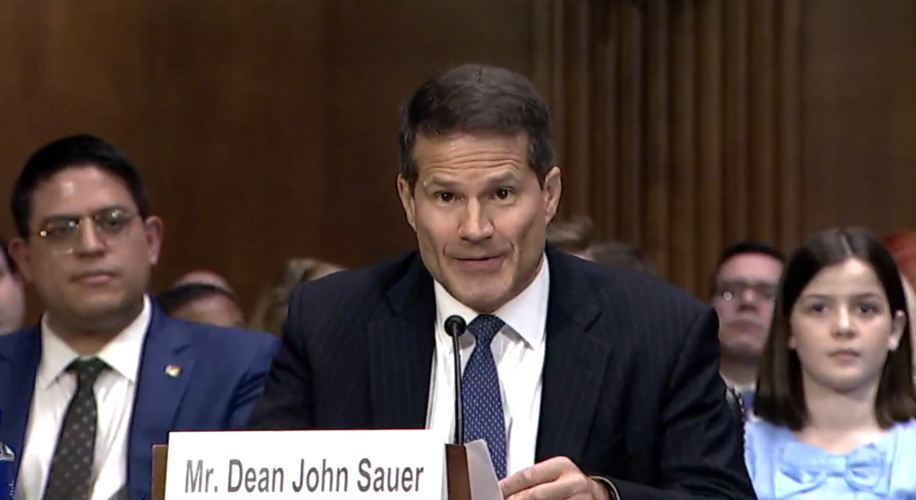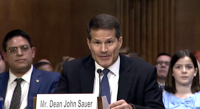
U.S. Solicitor General D. John Sauer
WASHINGTON, D.C. - The Justice Department says it will lend its weight to the effort by a Republican congressman to overturn Illinois' extended vote-by-mail counting deadlines, as the Trump administration has asked for the chance to argue that lower courts wrongly denied U.S. Rep. Mike Bost the chance to present his case and forcing Illinois election officals to prove they can constitutionally keep counting votes for two weeks after Election Day.
The arguments will not involve the merits of Bost's legal claims.
Rather, the high court will take on the question of whether federal judges in Chicago wrongly denied Bost the chance to challenge Illinois' vote-by-mail regime at all.
Bost, of downstate Jackson County, had turned to the Supreme Court for relief in November 2024, about five months after a divided federal appeals court in Chicago had sided with the state in shutting down Bost's lawsuit.
Bost and his co-plaintiffs had sued in 2022, just before that year's November general election. The lawsuit at the time sought a court order blocking Illinois from counting mail-in ballots received after Election Day, if those ballots included votes for federal offices, including U.S. House of Representatives, Senate or President.
The lawsuit took aim at a law enacted by Illinois' Democratic legislative supermajority in Springfield and Gov. JB Pritzker in 2020. That law had used the Covid pandemic to justify rewriting the state's election laws to greatly expand mail-in voting in Illinois.
The lawsuit claimed the Democrat-initiated and enacted laws violated federal election law and the constitutional rights of Illinois voters and candidates for federal office.
The lawsuit particularly targeted rules requiring election authorities to count all mail-in ballots received up to 14 days after Election Day. The rules further require election officials to accept and count those ballots even if there is no proof they were actually mailed by Election Day, as the law claims to otherwise require.
Bost's lawsuit specifically claims Illinois' vote-by-mail regime clashes with a federal law that establishes an official Election Day for federal offices.
Under that federal law, votes must be cast by "the first Tuesday after the first Monday in November of every even-numbered year."
However, the lawsuit says, the Illinois vote-by-mail rules improperly turn "Election Day" into an election period, without authorization from Congress.
Critics of the law have asserted the change in the law creates new opportunities for dominant parties and powerful campaign organizations to manipulate the system and cheat by counting questionable or illegitimate ballots.
The plaintiffs have asserted Illinois' balloting system could allow potentially hundreds of thousands of otherwise invalid votes to sway close election contests.
Bost and his co-plaintiffs who joined with him in the lawsuit have argued the law improperly "dilutes" the value of their votes and those case by others on or before Election Day, in keeping with federal law.

U.S. Rep. Mike Bost
Illinois state election officials, with the support of the Illinois Democratic Party and the past support of the U.S. Justice Department, under the administration of Democratic former President Joe Biden, moved to dismiss the lawsuit. They argued Illinois law doesn't conflict with federal law because the Illinois law still requires all ballots to be mailed on or before Election Day, even if the law allows votes to be counted without any independent proof they actually were mailed at all.
Illinois Democrats have noted in court filings that striking down the law would make it more difficult for Democrats to win elections, as Democrats disproportionately vote by mail, compared to Republicans and other voters.
However, in court, federal judges did not address any of the arguments related to the constitutionality of Illinois' vote-by-mail rules.
Rather, they sided with Illinois Democrats in finding Bost's lawsuit shouldn't be allowed to proceed at all.
They agreed with Democrats that Bost's petition should be rejected, in part, because Bost's district - a gerrymandered district drawn by Illinois Democrats to pack in Republican voters and allow Democrats to compete more effectively in other downstate U.S. House districts - is too Republican to allow any allegedly illegal mail-in ballots to place him in jeopardy of losing.
After the U.S. Supreme Court agreed to take up the question over Bost's standing in the case, Democrats have maintained their argument, adding that allowing Bost to prevail on this question would open the door to a parade of candidates taking advantage of their "automatic" standing to challenge state election law and rules at whim, whether or not those rules affect them.
Illinois Democrats have been joined in advancing that argument in briefs filed by other Democrat-led states and other organizations who essentially warn of chaos in the future if Bost is allowed to sue Illinois now.
Republican-led states, however, have weighed in on behalf of Bost, saying it should be obvious that Bost has standing to sue, as an elected representative who is subject to Illinois election laws and must spend money and time on adapting to potentially unconstitutional vote-counting rules.
They have also been joined by the Justice Department under the Trump administration. Reversing the position of the Justice Department under Biden, the Justice Department filed a brief with the Supreme Court arguing Bost clearly has standing to sue.
In the brief, filed in July, the Justice Department asserted Bost can sue because he is challenging election rules which Bost and others have claimed could be used to count illegally cast ballots.
"And the risk to a candidate’s electoral prospects from an unlawful vote-counting rule is significant, even if it may be small in many cases," the Justice Department wrote.
"For instance, it should be obvious that a candidate would have standing to sue if a State were threatening to discard timely votes. The same goes where the State is instead threatening to count untimely votes, especially when extending the ballot receipt period increases the campaign’s costs in monitoring ballot counting."
The Justice Department followed up that brief with a motion filed in August from U.S. Solicitor General D. John Sauer asking to join in oral arguments before the Supreme Court on behalf of Bost.
In the motion, Sauer said Bost's legal team has agreed to give the Justice Department 10 minutes of its time to argue in support of Bost's position.
"The United States has a significant interest in this case," Sauer wrote in the motion.
"It has a substantial interest in ensuring that proper parties can sue to enforce federal election law. And it has a substantial interest in ensuring that improper parties cannot invoke the jurisdiction of the federal courts."
The Supreme Court has not yet ruled on Sauer's motion.
Bost and his co-plaintiffs are represented before the Supreme Court by attorneys Paul D. Clement and James Y. Xi, of the firm of Clement & Murphy, of Alexandria, Virginia; and attorneys T. Russell Noble, Robert D. Popper and Eric W. Lee, of nonprofit conservative legal advocacy organization Judicial Watch, of Washington, D.C., and Gulfport, Mississippi.




